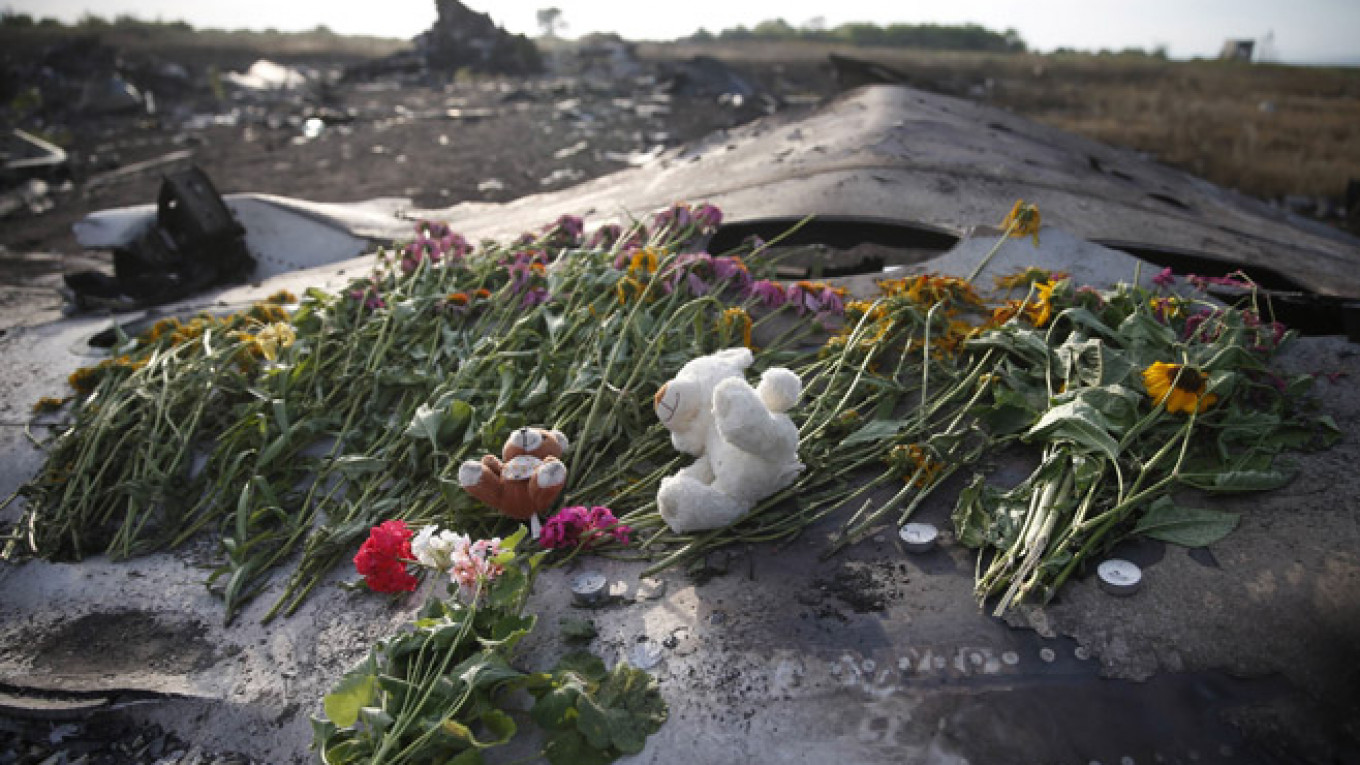It is a stark symbol of our times. On one side there was a wide-body jet liner, made by a U.S. company and operated by Malaysia Airlines, en route from one of the world's most prosperous and liberal cities to the capital of one of the fastest-growing Asian nations. On board were almost 300 passengers, citizens of more than a dozen countries. Among them were 80 children as well as scientists doing advanced AIDS research. The plane was cruising at 33,000 feet, there were movies and Wi-Fi on board, gourmet food and wine in business class.
It was flying, meanwhile, over a ragtag army straight out of the television series "Game of Thrones": mercenaries, ultra-nationalists and common thugs fighting for what they call "Red Orthodoxy." They are inspired, armed and supported by Russia, which is doing its best to bring war and destruction to a neighboring country.
Because of events in Ukraine, Russia has been swept by a wave of hatred, xenophobia and neo-imperialism. After 25 years of efforts to become a modern nation and rejoin the international community — efforts that were evident only six months ago when Russia staged the Sochi Olympics — it has turned to nostalgia for its sordid Soviet past.
In a flash, the country gleefully moved into a self-proclaimed isolation, rejecting not only modern Western influences but also betraying its own great culture, literature and the arts.
German Chancellor Angela Merkel reportedly wondered whether President Vladimir Putin is "still in touch with reality." Whether he is sane or not, Putin is pushing Russia into a war with the rest of the world.
It is a war that the country simply cannot win. True, the Russian Empire used to be extremely and very successfully expansionist. Someone has calculated that from 1683 to 1914 its territory grew at a rate of 55 square miles a day.
Today Russia is suffering from the phantom pains of imperialism. Whereas Russia's population increased by 25 percent between 1900 and 1914, reaching 200 million, it no longer has enough people to populate its current expanse. Worse, its population is aging and dwindling. Russia's neo-imperialism merely confirms Karl Marx's claim that in history everything happens twice, first as tragedy and then as farce.
Russia cannot win this war, but it can put up a nasty fight. It will not be a war conducted on the battlefield because Russia is too weak militarily and because Putin and his entourage, with their background in the secret services, prefer to fight wars by means of stealth and proxies. Thanks to Russia's nuclear arsenal, there is nothing the rest of the world can do except wait until the regime implodes on its own accord. And that might be a very long time away.
The West has enjoyed a comfortable life since World War II. Even the conflict with the Soviet Union, for all its intrigue, was a phony war. With the fall of the Berlin Wall, even this minor conflict seemed to have evaporated.
The lasting symbol of the new world order in the 1990s was seen along Italy's Adriatic Coast, where Europe sunned itself within earshot of Srebrenica, Sarajevo, Lasva Valley and other places where civilians were being ethnically cleansed and massacred.
But while the civil war in Yugoslavia remained isolated, it may be different now. Still, Europe and to a lesser degree the U.S. are flying 33,000 feet above a Russia-inspired battlefield, no doubt convinced that they are perfectly safe.
Alexei Bayer, a native Muscovite, lives in New York. His detective novel "Murder at the Dacha" was published by Russian Life Books in 2013.
A Message from The Moscow Times:
Dear readers,
We are facing unprecedented challenges. Russia's Prosecutor General's Office has designated The Moscow Times as an "undesirable" organization, criminalizing our work and putting our staff at risk of prosecution. This follows our earlier unjust labeling as a "foreign agent."
These actions are direct attempts to silence independent journalism in Russia. The authorities claim our work "discredits the decisions of the Russian leadership." We see things differently: we strive to provide accurate, unbiased reporting on Russia.
We, the journalists of The Moscow Times, refuse to be silenced. But to continue our work, we need your help.
Your support, no matter how small, makes a world of difference. If you can, please support us monthly starting from just $2. It's quick to set up, and every contribution makes a significant impact.
By supporting The Moscow Times, you're defending open, independent journalism in the face of repression. Thank you for standing with us.
Remind me later.






